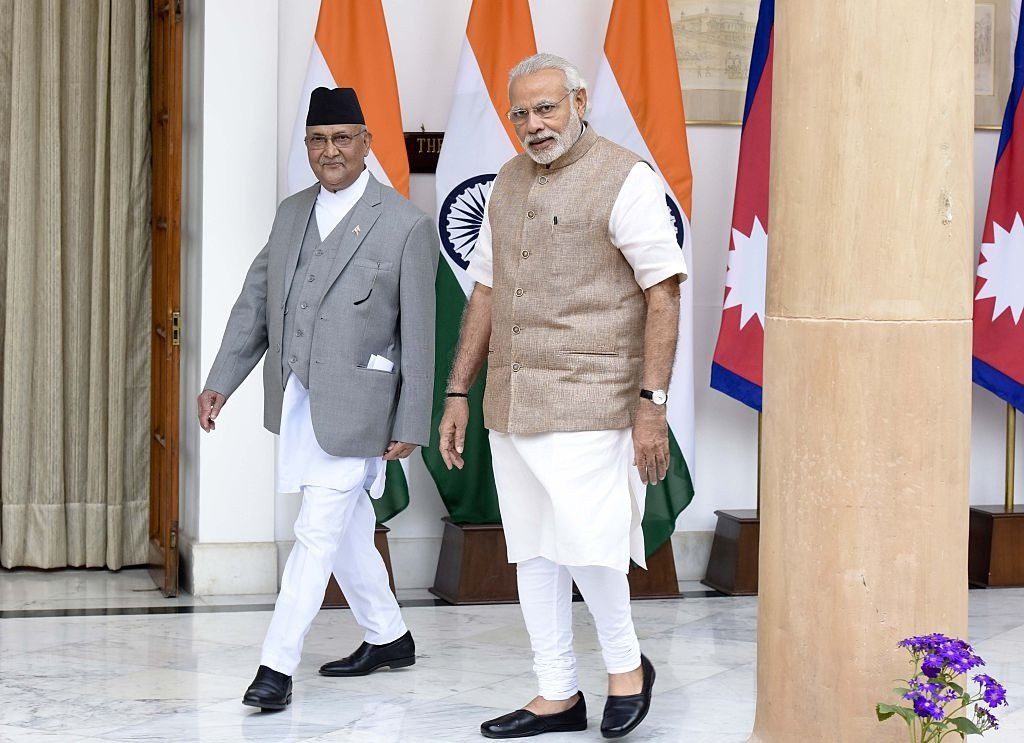Indian Prime Minister Narendra Modi today received a call from his Nepalese counterpart K.P. Sharma Oli to discuss “bilateral matters” hours after he mentioned his renewed priority to India’s ‘Neighbourhood First’ policy in his Independence Day speech Saturday.
This conversation between the leaders becomes significant as India and Nepal relationship has declined significantly in recent times. It’s the first occasion that the two leaders talked after Nepal released a controversial political map in May showing the disputed regions of Kalapani, Limpiyadhura, and Lipulekh as part of its own territory, India was quick to reject the move.
Nepal’s Ministry of Foreign Affairs statement read, “The two prime ministers agreed to continue discussions on bilateral matters in the future.
“Prime Minister Oli appreciated Prime Minister Modi’s renewed priority to neighborhood as spelt out in today’s Independence Day address. The Prime Minister of Nepal looked forward to meaningful bilateral cooperation,” the statement added.
Earlier Nepal PM Oli had wished PM Modi on the occasion of Indian Indidepence Day, thanking the Nepal PM, Modi tweeted, “Thank you PM @kpsharmaoli Ji for the Independence Day wishes.
The Ministry of External Affairs (MEA) also issued a statement, saying: “The Prime Minister of Nepal greeted the Government and People of India on the occasion of its 74th Independence Day, and also conveyed congratulations for India’s recent election as a non-permanent member of the UN Security Council.
“The leaders expressed mutual solidarity in the context of the efforts being made to minimise the impact of the Covid-19 pandemic in both countries. The Prime Minister offered India’s continued support to Nepal in this regard.”
It further added — Prime Minister Modi thanked Oli and recalled the “civilizational and cultural links that India and Nepal share”.
Both the leaders last spoke in April when the Covid-19 pandemic and the subsequent lockdown was raging in South Asia and the world, which prompted Modi to hold a video conference with SAARC leaders.
Two day days from now, on 17 August, India and Nepal will hold a high-level meeting. India’s Ambassador to Nepal Vinay Mohan Kwatra and Nepal Foreign Secretary Shanker Das Bairagi will hold the meeting under the framework of the oversight mechanism that last met in 2016.
Silence on border talks
Sources, however, said there was neither any discussion between the two leaders on the border row, nor a decision was taken on when the proposed foreign secretary-level talks between the two sides will be held, something that Nepal has been demanding for almost a year now.
Nepal has been seeking a discussion on the border issue since last November when India released a new political map of its own after the scrapping of Article 370 on 5 August.
“The call was purely congratulator — Not a single sentence on the border issue was discussed beyond platitudes,” a senior official told revealed’.
The India-Nepal difference in recent times
Both countries have had a decline in the relationship not only over a map but also over Lord Ram and Gautam Buddha.
Last month, PM Oli had said that the “real” Ayodhya, where Hindu deity Ram was born, was in Nepal. Earlier this month, Kathmandu vigorously responded to External Affairs Minister S. Jaishankar’s statement that Gautam Buddha was “one of the greatest Indians”, asserting that Buddha was born in Lumbini in the Himalayan nation.



